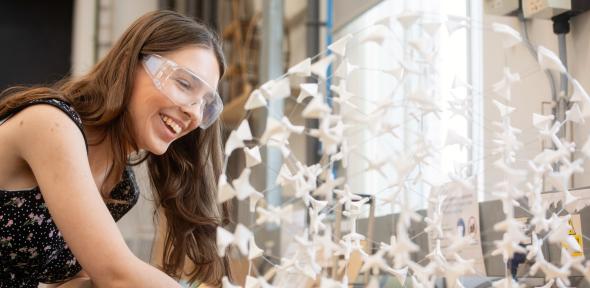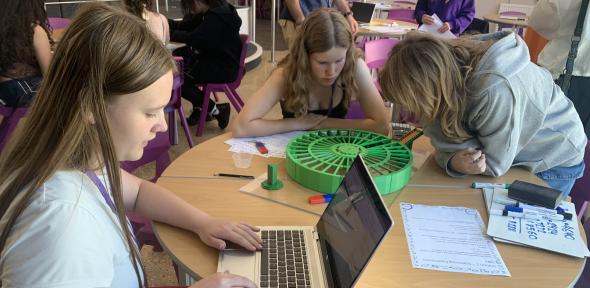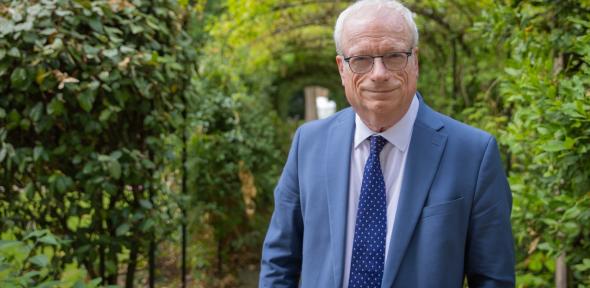
Originally founded with funding from the Department of Education and philanthropy, the Isaac Physics platform and STEM SMART programme run by the University of Cambridge have proven results in improving A-level students’ grades and boosting their success in securing a place to study STEM subjects at research-intensive universities. The future of this pioneering STEM provision, which is freely available to anyone, wherever they are in the world, has now been made significantly more secure with an anonymous donation of £6.25 million that is mirrored with a similar gift to the University of Oxford.
The Isaac Physics online platform was founded in 2013 by Professor Lisa Jardine-Wright and Professor Mark Warner at Cambridge’s Department of Physics, specifically to support physics teaching at A-level in response to the challenges facing many state schools that teach physical sciences. Teachers use the unique platform to set homework, which is marked automatically. Pupils develop essential problem-solving skills as they are guided through questions rather than being supplied with answers. Resources have since been expanded to cover maths, further maths, chemistry, and biology, and to support students in physics from age 11 through to university. It can be used in the classroom and beyond—anyone can sign up for a free account and use the available resources.
Professor Lisa Jardine-Wright, Director of Isaac Physics and Co-Director of STEM SMART, said “We are absolutely thrilled that thanks to this generous gift, Isaac Physics and STEM SMART are now on a much more secure footing until 2031, enabling us to support hundreds of thousands more pupils to gain essential problem-solving skills and pursue STEM degrees”.
Dr Michael Sutherland, Co-Director of STEM SMART, added, “This transformational gift will have long-term impact, not only for those students who gain the confidence and skills to study STEM subjects at university but also for wider society, because when these young people graduate they can provide a critical boost to the country’s STEM workforce”.
Second year student Rebecca Millar believes the STEM SMART programme played a pivotal role in her applying to study Natural Sciences at Cambridge: “Being here has changed a lot about my life—the people I know and the subjects I am doing. I didn’t realise there were courses like NatSci.”
The STEM SMART widening participation programme leverages the scalability of the Isaac Physics platform to engage thousands of sixth-form students from disadvantaged backgrounds when they are planning their university applications, raising their aspirations and confidence to apply to study STEM degrees at research-intensive universities. Independent analysis of pupils’ A-levels and UCAS applications shows that STEM SMART students achieved higher A-level grades and secured more places at top universities compared with matched cohorts not on the programme.
Amira Yonis Sheikmohamud, a second-year Mechanical Engineering student at Imperial College London, who took part in STEM SMART, said it “gives people access to materials they wouldn’t otherwise have, unless they were in a fee-paying school, so the programme helps bridge that gap.”
Since its inception, more than 700,000 Isaac Physics accounts have been created with users from over 100 countries.
Professor Bhaskar Vira, Pro-Vice-Chancellor for Education and Environmental Sustainability, University of Cambridge, said, “The University is very grateful for this exceptional gift that will benefit significant numbers of school pupils and teachers, and bring more talented young people to study STEM degrees at Cambridge and other research-intensive universities. Closing the attainment gap in science and maths A-levels is crucial for developing society’s ability to solve the technological challenges of the future”.
Joint major gift to Cambridge and Oxford Universities helps boost initiatives to address challenges in science education and increase the number of pupils progressing to STEM degrees

The text in this work is licensed under a Creative Commons Attribution-NonCommercial-ShareAlike 4.0 International License. Images, including our videos, are Copyright ©University of Cambridge and licensors/contributors as identified. All rights reserved. We make our image and video content available in a number of ways – on our main website under its Terms and conditions, and on a range of channels including social media that permit your use and sharing of our content under their respective Terms.







